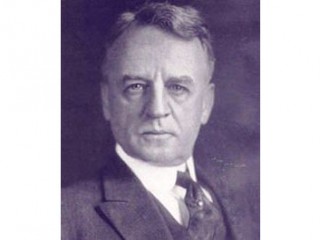
Dwight Morrow biography
Date of birth : 1873-01-11
Date of death : 1931-10-05
Birthplace : Huntington, West Virginia
Nationality : American
Category : Politics
Last modified : 2011-03-07
Credited as : Lawyer and banker, diplomat,
Dwight Whitney Morrow was an American lawyer, a banker, and an unconventional but highly successful diplomat.
Dwight Morrow was born in Huntington, W.Va., on Jan. 11, 1873. He was one of eight children, and his family, though of intellectual bent, was in modest circumstances. He attended Amherst College in Massachusetts, where he was a classmate of Calvin Coolidge, and he conceived a strong admiration for the silent New Englander, an admiration that tells something of Morrow's political philosophy. In 1896 he entered the Columbia Law School; he graduated in 1899.
Morrow then entered the firm of Reed, Simpson, Thacher, and Varbum in New York and was made a member of the firm in 1905. Often his work was concerned with the organization of important businesses, and this brought him into contact with many leading figures in the world of industry. In 1914 he was made a member of J. P. Morgan & Company and continued in the banking business until 1927. During World War I he performed important services in connection with the Morgan loans to the Allied powers and made a significant study of the vital problem of war transport. He was an ardent partisan of Coolidge for president and lobbied pertinaciously for him at the convention of 1920.
In 1927, as president, Coolidge appointed Morrow as ambassador to Mexico. At this time relations between Washington and Mexico City were tense because of Mexican attacks on the American oil industry and land-holders there. American opinion was also stirred by the attacks of the regime of President Plutarco Elias Calles upon the Church. Morrow's diplomacy was unconventional. He dealt firsthand with the President, breakfasting with him at his private ranch and accompanying him on a trip in which the two men inspected the impressive irrigation schemes under way in Mexico. Building up goodwill, the ambassador was able to secure an important modification of the Mexican oil laws and to soften the attack upon the Church. His success was dramatized by the visit of Charles Lindbergh to Mexico, which helped to produce a new attitude toward the United States.
In 1930 Morrow was a delegate to the London Naval Conference, and in the same year he was elected to the U.S. Senate. He died in Englewood, N.J., on Oct. 5, 1931.
In politics Morrow was a temperate conservative and a regular Republican, but he had a knack for understanding views other than his own. His diplomatic methods emphasized reason and goodwill rather than the use of force, and, though the results he achieved were not lasting, his mission marked an important step in what became the good-neighbor policy.
















